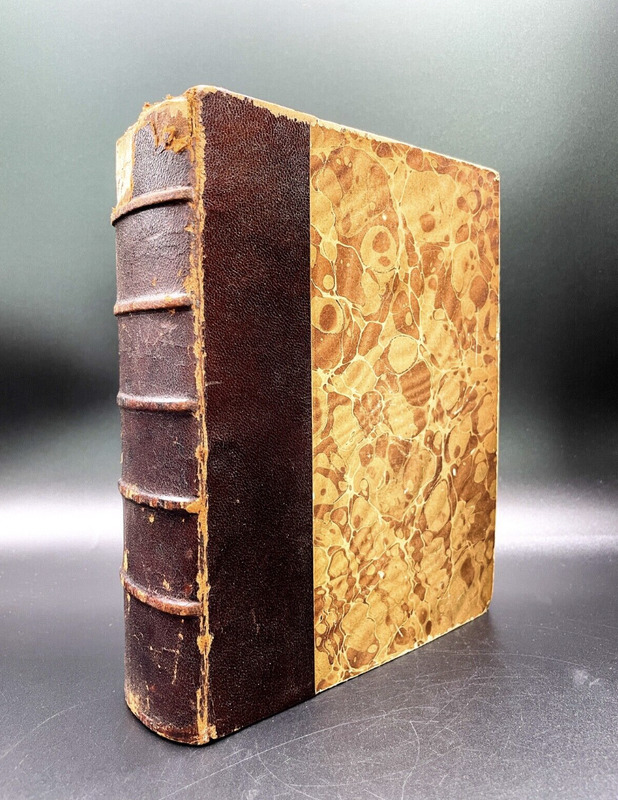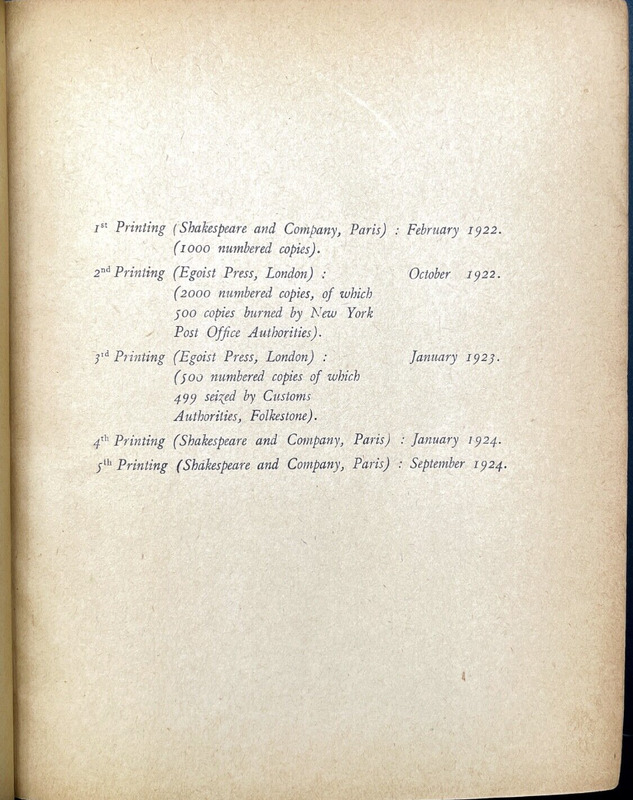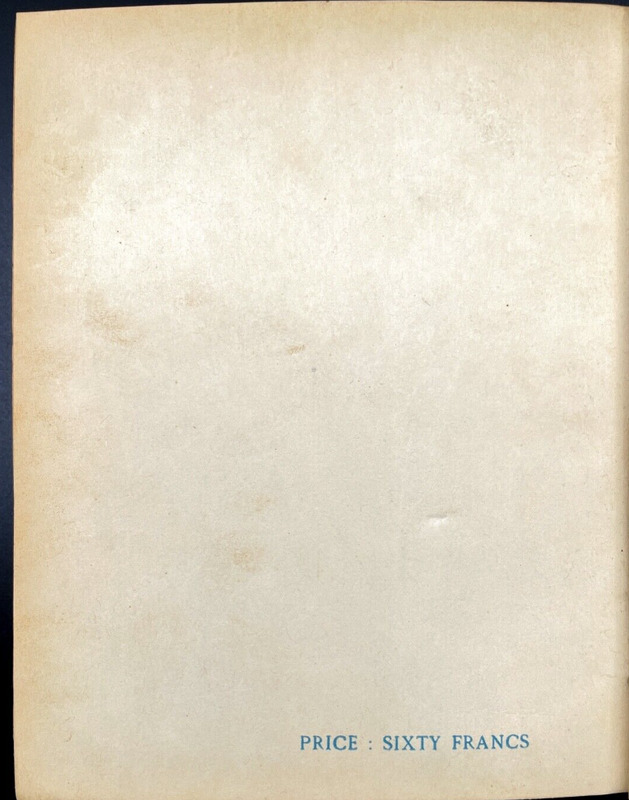Billson, Matt (Editions)
Object Rationale:
My chosen object is the fifth pressing of the first edition of Ulysses published by Shakespeare and Company in September 1924. This edition of Ulysses is a hardcover. A quarter of the book cover is covered by dark red leather, while the other three-quarters of the surface is covered in white, blue, and red leather in a kaleidoscope-esque design. The book title nor the author is not seen on either side of the cover. Instead, the information is located on the spine of the book. The spine is in sturdy condition and legible. There are two rectangular designs on the top and bottom halves of the spine, with a square in the middle. The portion between the square and the upper rectangle includes Joyce’s full name while the square’s lower position includes the title Ulysses. The book has a few signs of aging, such as tiny markings on the spine and small brown streaks on some pages. However, considering the age of this edition, the text is in excellent condition. A page before chapter one includes a list of previous publications with the number of copies produced and included when applicable. The book cost sixty franks. The price tag is located on a page near the end of the novel.
I chose this object for two reasons. The first reason was the history of the publications on the title page. What caught my attention was the fourth and fifth pressings did not include the number of books produced unlike the first three editions mentioned. By viewing the ninth printing of Ulysses published by Shakespeare and Company online I confirmed they stopped including the number of books published per edition after the third edition. This information will be of interest to me as it shows that Ulysses began to be more available to the public after 1924, with many editions printed in quick succession in 1924. The wider availability of the text will connect to my question of wheter or not Bloom would purchase Ulysses if he were a real person in 1924 as the wider availability of the text suggests Bloom would not have any issues finding the book.
The second reason I chose this text was the price tag. Seeing such an old book with the original price included piqued my interest and helped me narrow down my rationale. The price tag is of interest to my research as I can convert sixty French francs into Pound sterling using a historical currency converter. Then, I can compare the price of the book in Pound sterling to Bloom’s daily budget in ”Ithaca" to support or refute the question of wheter or not Bloom would buy Ulysses in 1924.
Topic & Literature Review:
The topic I have chosen is money and how it relates to Bloom’s religious identity. My selected object will relate to my topic as the price tag of sixty francs will connect to my question of wheter or not Bloom would purchase Ulysses. By conducting this research, I hope to uncover how money shapes Bloom’s religious identity and to answer the question: Would Bloom purchase the fifth pressing of the first edition of Ulysses published by Shakespeare and Company if he were a real person in 1924?
Scholars have said many things relating to money in James Joyce’s Ulysses. For example, Yeonsik Jung argues that Leopold Bloom’s economic position in 1904 was more than stable, yet Bloom still reflects on the ideology of money and how it affects his social relations. (Jung 220-22). Bloom’s daily allowance is two pounds, nineteen shillings, and threepence (221). According to Jung, a working man in Ireland in 1904 earned eighteen shillings a week, suggesting Bloom’s stable financial position (221). However, Bloom lives a frugal life and imagines tearing up a cheque in “Lotus-Eaters”, which Jung argues reflects Bloom’s identity as a Hungarian-Jewish man who experiences racism. Jung’s argument connects to my topic as his rejection of spending his earned capital due to his religious identity is focal to my argument.
Daniel Moshenberg also comments on ideology in Ulysses concerning money through a Marxist perspective by analyzing the word “capital”. Moshenberg finds that Joyce used the word “capital” fourteen times in the text, which all connect to the idea of capital meaning a physical place, writing, or money (Moshenberg 343). Moshenberg compares Joyce’s meaning of capital to Karl Marx’s theory of capital and focuses on the soap purchased by Bloom in “Lotus Eaters” as an object to view his journey throughout the text (338-43). Moshenberg’s argument connects to my topic as the soap purchased for Molly indicates that Bloom does spend his capital despite his frugality and he is willing to buy items for himself and for others.
Money in Ulysses is also viewed through the lens of race. Amy Feinstein argues that epithets relating to Jewish people in Ulysses link race and economics and Leopold Bloom is homogenized as the character who most thoroughly exemplifies the role between Jewishness and the economy and the problems that come with being Jewish (Feinstein 40-41). Specifically, Bloom’s homogenization allows other characters to stereotype all Jewish people into whatever their perceptions of Bloom are (40). Even non-Jewish people whose profession involves working with money are considered Jewish and held to the same level of ridicule as Bloom (40). Feinstein’s argument connects to my topic as it establishes people stereotype Bloom for being Jewish despite Bloom not fully adhering to the identity. Furthermore, the homogenization of Bloom speaks to how Catholics in Ireland viewed Jewish people as lesser, which may explain why Bloom rejects both his Jewish and Catholic identity.
Bloom’s job as an advertiser is also a crucial competent of money in Ulysses. Mark Osteen argues that Bloom’s job as an advertiser is crucial for his economic behaviours and his Irish identity as the money he accumulates advances the interests of himself and Ireland’s economy (Osteen 735). Bloom uses money from his work to purchase material goods and to pay off debt which boosts Ireland's economy. As an adman, Bloom is in a powerful position to use advertisements to influence Ireland’s economy both formally and informally and reclaim its economy from British rule and progress his ambiguous religious identity (735). Osteen’s argument connects to my topic as part of Bloom’s capital is earned through his job as an adman which enables him to purchase items and although he works for the interests of Ireland’s economy, Bloom does not adhere to the same religious identity as the majority of Irish citizens.
The role of capitalism and Jewishness are other perspectives scholars have viewed Ulysses. Gary Levine considers these two concepts and argues that Joyce balances “Jewish capitalism” and “Jewish socialisim” to represent Ireland’s new economy and Bloom is the character who best represents this concept (Levine 183). Levine refers to Bloom as a ”middleman minority”, which refers to someone who organizes the transport of goods and services in an economy where a population, for cultural reasons, fails to provide its middlemen (172). Bloom’s status as a “middleman minority” asserts his secure financial position while relating capitalism's failure to provide for middle-class Irish citizens.
Arguments & Answers:
Money is key to Leopold’s Bloom role in Ulysses; from his job as an adman to his financial frugality, money is a critical component of Bloom’s daily endeavours and identity. In particular, Bloom’s financial frugality reveals many aspects of his religious identity. I argue that while Bloom is financially secure, his choice to live life frugally speaks to his rejection of validating Catholics in Ireland and their racism towards his Jewish identity despite already struggling with his religious identity.
As mentioned above, Bloom’s daily allowance is two pounds, nineteen shillings, and threepence (Jung 221). In “Ithaca” we learn Bloom holds a further £518 in an endowment of an assurance policy and a bank passbook, with a further £900 in Canadian stocks, which suggests Bloom can afford to live a more luxurious life. (Joyce 17.1854–65). However, Bloom lives frugally rather than in luxury to not appease the Catholics who consistently ridicule Bloom for being Jewish. For example, in “Lotus Eaters”, Bloom imagines tearing up a cheque worth £100 (5.303-05). This action demonstrates his desire to invalidate how others perceive him by ripping up an object associated with money and thus, ripping away his Jewish identity.
Why would Bloom not want to spend his money? Because spending his capital validates the stereotype that Jewish people are greedy with money. Bloom already struggles with his own identity as a descendant of a Hungarian Jewish father. For example, Bloom’s argument with the Citizen in “Cyclops” suggests that while Bloom does not embrace being Jewish, he also does not embrace Catholicism or characteristics important to the Irish identity at the time, such as Irish nationalism (12. 498). Bloom’s choice to eat a pork kidney for breakfast also establishes his rejection of his Jewish identity (4. 2-5). Bloom’s indifference towards Catholicism and rejection of his Jewish identity asserts his struggle of finding his religious identity while simultaneously suggesting that Bloom rejects religion altogether because it creates conflict based only on nationality.
Although Bloom is frugal, that does not mean he will not spend money. The 1924 edition of Ulysses cost 60 French francs; sixty French Francs was equivalent to £0.58 in 1924, or 10 shillings (“Archival Currency Converter”). Bloom’s financial position meant he could purchase Ulysses, but would he? As Shakespeare and Company began mass-producing copies of Ulysses in 1924, finding the book would not be an obstacle. In “Ithica” Bloom owes one shilling for a book rental fee, which establishes Bloom does read (17. 1465). Bloom’s budget also notes purchasing two Banbury cakes and a coffee and a bun for one and four pence respectively, suggesting that Bloom will buy products if they pique his interest or are convenient to him (17. 1465). Although Bloom lives frugally, I believe he would purchase Ulysses if he were real and alive in 1924 because the book became more available in 1924, he reads books, and he will spend his money if he sees something he likes. Furthermore, reading Ulysees would help Bloom explore his religious identity and help him decide wheter or not he needs religion in his life.
Works cited
Challis, David. “Archival Currency Converter 1916-1940.” https://canvasresources-prod.le.unimelb.edu.au/projects/currency_calc/.
Feinstein, Amy. “Usurers and Usurpers: Race, Nation, and the Performance of Jewish Mercantilism in ‘Ulysses.’” James Joyce Quarterly, vol. 44, no. 1, 2006, pp. 39–58, http://www.jstor.org/stable/25570993.
Joyce, James. Ulysses. Dublin: Penguin Books, 2022.
Jung, Yeonsik. “‘Dead Treasure, Hollow Shells’: Money and Ideology in James Joyce's Ulysses.” The Explicator, vol. 75, no. 4, 2017, pp. 220–24., https://doi.org/10.1080/00144940.2017.1379461.
Levine, Gary. The Merchant of Modernism: The Economic Jew in Anglo-American Literature, 1864-1939, Taylor & Francis Group, 2002, pp. 163-85, https://ebookcentral.proquest.com/lib/uvic/detail.action?docID=1581706.
Moshenberg, Daniel. “The Capital Couple: Speculating on ‘Ulysses.’” James Joyce Quarterly, vol. 25, no. 3, 1988, pp. 333–44., http://www.jstor.org/stable/25484883.
Osteen, Mark. “Seeking Renewal: Bloom, Advertising, and the Domestic Economy.” James Joyce Quarterly, vol. 30/31, 1993, pp. 717–38., http://www.jstor.org/stable/25515765.



